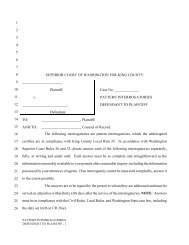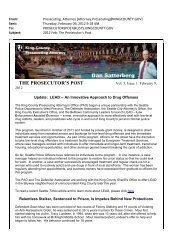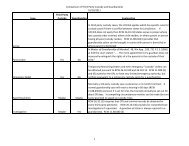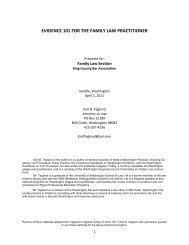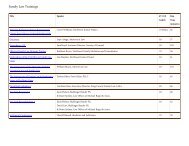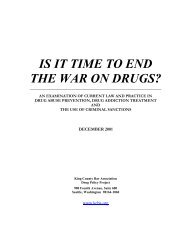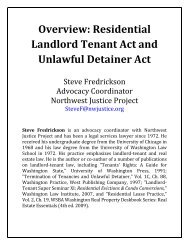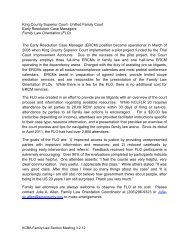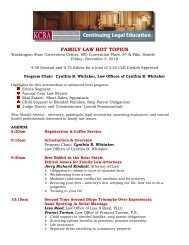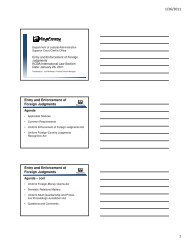Effective Drug Control: Toward A New Legal Framework
Effective Drug Control: Toward A New Legal Framework
Effective Drug Control: Toward A New Legal Framework
Create successful ePaper yourself
Turn your PDF publications into a flip-book with our unique Google optimized e-Paper software.
Anti-discrimination. The fundamental principle underlying the Commerce<br />
Clause is that a state may use its police powers to protect public health in a way that<br />
incidentally affects interstate commerce as long as the act is not discriminatory toward<br />
interstate commerce. 542 Accordingly, if Washington chose to use its police powers to<br />
protect public health by regulating and controlling psychoactive substances, rather than<br />
leaving them in the hands of criminal enterprises, such action might not be upheld where<br />
Washington is intentionally “discriminating” against interstate commerce. Albeit, the<br />
commerce is illicit, but the Commerce Clause has long been interpreted to give Congress<br />
the power to regulate even illicit commerce through means that resemble police power. 543<br />
Local nature of problems. Under the “Cooley Doctrine,” states are free to<br />
regulate things of a local nature that require different treatment from state to state and<br />
may not regulate things that require a uniform national treatment. 544 The diversion and<br />
misuse of controlled substances has been declared by Congress to be a national problem<br />
requiring a national solution, justifying federal preemption in this policy area. However,<br />
the U.S. Supreme Court has held in other cases that “simply because Congress may<br />
conclude that a particular activity substantially affects interstate commerce does not<br />
necessarily make it so” and that “the Constitution requires a distinction between what is<br />
truly national and what is truly local.” 545 The Court has not yet considered whether the<br />
<strong>Control</strong>led Substances Act improperly prevents states from effectively regulating the<br />
“local nature” of their respective drug abuse problems. 546<br />
Rational means to legitimate ends. Any state action affecting interstate<br />
commerce requires a legitimate state end and a rational means to that end. 547 Under this<br />
balancing test, the state of Washington’s new regulatory framework for controlling<br />
psychoactive substances should satisfy the requirement that the local benefit outweigh the<br />
burden on commerce, where the commerce that is “burdened” is illicit commerce<br />
controlled by criminal enterprises.<br />
Some discrimination allowed. When there is a legitimate local interest and no<br />
nondiscriminatory means to achieve it, a discriminatory means may be used to limit<br />
interstate commerce. 548 By establishing its own, intrastate system of psychoactive drug<br />
control in order to render the violent black market unprofitable, to restrict access by<br />
young persons to drugs and to open new gateways to treat hard-to-reach populations, the<br />
state of Washington could clearly demonstrate a “legitimate local interest,” and with no<br />
non-discriminatory means to achieve it, where the “competition” is organized crime.<br />
The principles above are used to test state action only in the absence of federal<br />
legislation – the notion of the “Dormant Commerce Clause.” 549 Nevertheless, even<br />
though Congress has “spoken” definitively in the area of drug control, applying these<br />
federalist principles to current drug policy reveals the perverse outcomes that have arisen<br />
from federal preemption in this area of the law. Federal drug prohibition has not only<br />
guaranteed a thriving illicit market controlled by criminal enterprises, it has also put that<br />
illicit market beyond the reach of the police powers of states that might elect to address<br />
their societal drug abuse problems through means other than drug prohibition.



